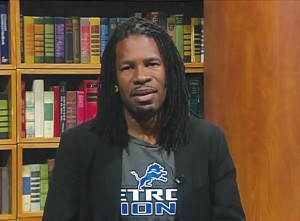I am gay. And I am black.

by LZ Granderson, CNN Contributor
Editor’s note: LZ Granderson, who writes a weekly column for CNN.com, was named journalist of the year by the National Lesbian and Gay Journalists Association and is a 2011 Online Journalism Award finalist for commentary. He is a senior writer and columnist for ESPN the Magazine and ESPN.com.
It feels as if I’ve been living a double life all of these years, and I do not want to deceive you, or myself, any longer. The burden has become too heavy, the struggle to deny my true self too great.
In order to be free I have tell you something. I am black.
I know; I should have told you sooner. But I was afraid. After all, I’ve already shared with you that I am gay and, well, we all know a person can’t be both.
At least that’s how it feels the conversation is usually framed: There’s a black community and a gay community, and the two conflict and do not mix. Since President Obama voiced support for marriage equality and now the board of the NAACP has followed suit, the narrative is that the black community is trying to make room at the table for gay people.
Allow me to correct this storyline: No one is making room for gay people; gay people have always been at the table, at the forefront.
What Obama, Jay-Z, Julian Bond, Floyd Mayweather Jr. and others have done over the past week is simply acknowledge life is not an “either/or” proposition but rather an emphatic “and.” Boxes are for shoes, not people. So while compartmentalizing folks makes it easier to herd people into target groups and voting blocs, it’s a gross misrepresentation of the reality of humanity.
I am gay. And I am black.
And despite the efforts of black religious conservatives to ignore that intersection, the truth is that intersection is a major part of black culture. It’s in our literature (James Baldwin), our films (Lee Daniels), in politics, baseball fields (Glenn Burke), the Black Panthers (Angela Davis), and the civil rights movement (Bayard Rustin).
That intersection exists in our hair salons, barbershops, and, yes, even our churches.
Before becoming a journalist, I worked in youth ministry in two churches in my early 20s. I lived with one of my pastors and his family and would study the Bible for hours on end under his tutelage. I fasted and tithed. I poured my heart out to the kids in the congregation. On occasion I even would fall asleep on the steps of the altar worshipping my God.
I am black. I am gay. And yes, I am a Christian.
I also know I was not the only gay black man in ministry desperately trying to pray the gay away. In fact, I know one prominent choir director who finally had the courage to come out not too long ago.
This is the messy and beautiful reality of humanity. The National Organization for Marriage, a fringe antigay think tank, actually had outlined a plan to try to race-bait the black community into fighting with…itself.
“N.O.M.’s memos detailed its campaign to direct money to a handful of African-American clergy in order to attack gay and lesbian couples that have made a lifelong promise to one another,” said Sharon Lettman-Hicks, the executive director of the National Black Justice Coalition. “The organization admitted their key goal is to drive a wedge between gays and blacks.”
But I am black, and I am gay. A wedge cannot be driven between parts of my being.
I was talking with NFL Hall of Famer Michael Irvin this past weekend, and he told me something that made a lot of sense. He said, in the fight for equality, you must be willing to run a race in which you may not be around to see the finish line. Not necessarily a pick-me-up, but filled with truth nonetheless.
We are just beginning to have this conversation about sexual orientation and gender identity within the black community, but it is long overdue. A study conducted by the National Center for Children in Poverty found that African-American and Native-American young people are “overrepresented” in the population of runaways. The study also found that between 20 percent and 40 percent of all homeless youth identify themselves as lesbian, gay, bisexual, transgender, or questioning.
Many say they were kicked out of their homes or ran away because of violence. Even on the streets, these children are much more likely than others to be abused. How can the black community heal if it turns a blind eye to its own children?
It doesn’t make any sense.
Blacks trying to separate the gay community from blacks? Well, that makes even less sense. After all, a house divided against itself cannot stand, and gay people are, and always will be, living in this house.
You can follow LZ Granderson on Twitter: @locs_n_laughs.











FB Comments